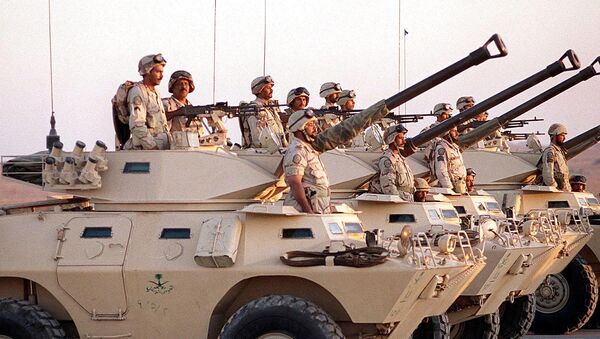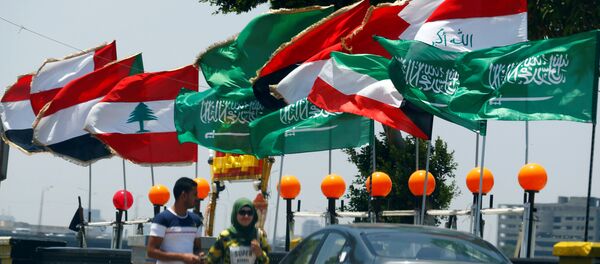He is due to hear the positions of the states on the ongoing diplomatic row around Qatar as well as to offer France's contribution to the mediation efforts led by Kuwait, according to the French Foreign Ministry.
On June 5, Saudi Arabia, Egypt, Bahrain and the United Arab Emirates cut diplomatic relations with Qatar and imposed a blockade on the Persian Gulf country, accusing it of supporting terrorism and interfering in their domestic affairs.
French FM arrives in Saudi Arabia for #Qatarcrisis https://t.co/ujNAJinPYx pic.twitter.com/01b7iC5sWC
— China Xinhua News (@XHNews) 16 июля 2017 г.
On July 3, the four countries agreed to a two-day extension of the deadline given to Qatar to respond to their list of demands.
The 13-point list of demands includes the severance of Qatar’s relations with Iran, closure of Turkey’s military base in Qatar and a shutdown of the TV channel Al Jazeera.
In an interview with Sputnik, Bahraini political analyst Said al-Shahhabi commented on the current stage of the Qatar crisis.
According to him, Saudi Arabia failed to work out an action plan in the event that the scenario does not develop according to Riyadh's scenario.
"The Kingdom [of Saudi Arabia] planned a zero-alternatives aggressive attack against Qatar which Riyadh thought would give way to a full-fledged offensive. However, now it has become clear to everyone that this plan has flopped," Shahhabi said, questioning Riyadh's ability to act independently.
In this vein, he referred to the Cooperation Council of the Arab States of the Persian Gulf (GCC), which he recalled "was established in 1981 at the beginning of the Iraq-Iran war."
US Fails to Reconcile Arab Allies as Qatar Crisis Spiralshttps://t.co/sQ4iFQZ84P#SaudiArabia#Qatar#US#SaudiQatarRow pic.twitter.com/f6rF1trWqH
— Alwaght (@EnglishAlwaght) 13 июля 2017 г.
"Saudi Arabia was a representative of Western forces in the GCC and could not act independently. Such a situation remains in place now: Riyadh can fight in Yemen, Syria and Libya, but it cannot grapple with GCC members,[ which include Bahrain, Kuwait, Oman, Qatar, Saudi Arabia, and the United Arab Emirates]," Shahhabi said.
He explained that "Saudi Arabia planned to exert pressure on Qatar by military means, but it was not supported by its Western partners because they saw it as something that they could not benefit from."
Saudi-Led Regimes Escalate Crisis with Qatar by Imposing New Sanctionshttps://t.co/JbTtvuXeyj#SaudiArabia#Qatar#SaudiQataRow pic.twitter.com/KA0McCCUdc
— Alwaght (@EnglishAlwaght) 7 июля 2017 г.
"After that, the Saudis' plans for further escalation of the conflict collapsed, and apart from military force they have no other way to exert significant pressure on Qatar," Shahhabi added.
"Riyadh found itself in a very difficult situation, when Qatar rejected 13 demands. From this moment, a period of exhausting conflict for both sides began amid the strengthening of Qatar's position and tension within the GCC. Riyadh does not have enough power to act in the region without Western forces' support, something that was confirmed during campaigns against Yemen, Syria, Iraq, Libya and Qatar," he pointed out.
"It is obvious that today's actions by Riyadh have not been approved by Western partners, and now it needs to reckon with the real state of affairs," Shahhabi said referring to Britain's unwillingness to see Saudi Arabia becoming a leader both in the region and the GCC.
Meanwhile, Sputnik asked Fatih Birol, executive director of the International Energy Agency (IEA) whether the Qatar crisis poses a threat to energy security.
"The Qatari crisis once again confirmed this, indicating the importance of ensuring the security of natural gas supplies," he said. Qatar is one of the top suppliers of natural gas in the world.
"We hope that the crisis in relations between Qatar and the Gulf countries will be resolved in the near future, and that the escalation of the conflict will not take place. However, it is necessary to remember the potential threats that any regional crisis poses and act in accordance with these realities," Birol concluded.





